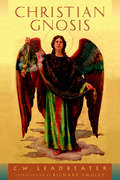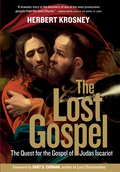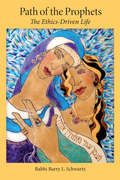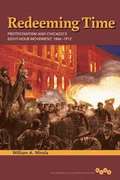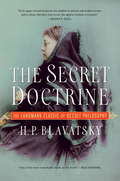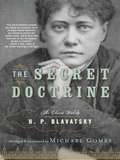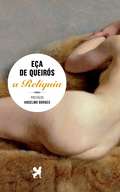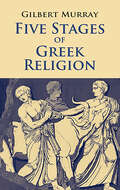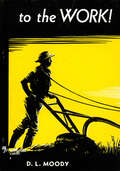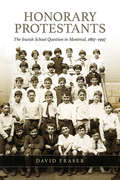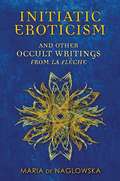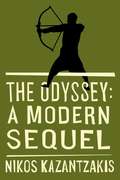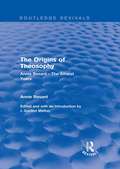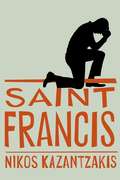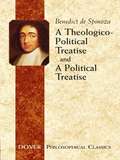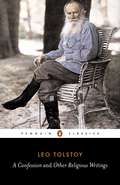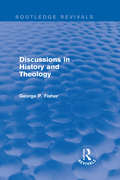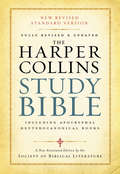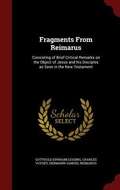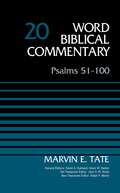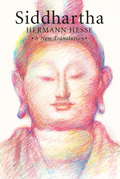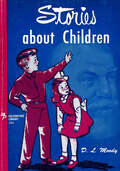- Table View
- List View
Christian Gnosis
by Richard Smoley C W LeadbeaterThen shall the candidate be bound upon the wooden cross . . . After the third day he shall be brought back from the dead and carried up to heaven to be on the right hand of Him from whom he came. Surprisingly, these lines are from an Egyptian initiation ritual thousands of years before the Christian drama. Linking the two is just one fascinating element in this profound introduction to esoteric Christianity, as timely today as when it was first published in 1920. Famed clairvoyant Charles Webster Leadbeater was a bishop of the Liberal Catholic Church, which preserves the sacraments while interpreting the scriptures with maximum freedom. He quotes St. Augustine himself saying that what we now call Christianity emerged at the very beginning of humanity as the one true religion. To access its transformative force, Leadbeater returns to original teachings and decodes its story symbolically as a guide for direct knowledge (Gr: gnosis) of the Divine. "As Christ had the Godhead behind Him, so have we the same power, although not yet unfolded as fully," he says. "Nevertheless, it is only a question of development, and that development is certain." With the authority of a scientist and a mystic, he addresses such topics as the birth of Christ in the heart; God's utter love; divine grace; angelic help; the true meaning of salvation; and reincarnation and the evolution of the soul.
Christian Gnosis
by Charles Webster Leadbeater Richard SmoleyThen shall the candidate be bound upon the wooden cross . . . After the third day he shall be brought back from the dead and carried up to heaven to be on the right hand of Him from whom he came. Surprisingly, these lines are from an Egyptian initiation ritual thousands of years before the Christian drama. Linking the two is just one fascinating element in this profound introduction to esoteric Christianity, as timely today as when it was first published in 1920. Famed clairvoyant Charles Webster Leadbeater was a bishop of the Liberal Catholic Church, which preserves the sacraments while interpreting the scriptures with maximum freedom. He quotes St. Augustine himself saying that what we now call Christianity emerged at the very beginning of humanity as the one true religion. To access its transformative force, Leadbeater returns to original teachings and decodes its story symbolically as a guide for direct knowledge (Gr: gnosis) of the Divine. "As Christ had the Godhead behind Him, so have we the same power, although not yet unfolded as fully," he says. "Nevertheless, it is only a question of development, and that development is certain." With the authority of a scientist and a mystic, he addresses such topics as the birth of Christ in the heart; God's utter love; divine grace; angelic help; the true meaning of salvation; and reincarnation and the evolution of the soul.
The Lost Gospel: The Quest for the Gospel of Judas Iscariot
by Herbert KrosneyThis compelling and exhaustively researched account reveals the truth behind one of the greatest Judeo Christian archaeology of the century - a 1,600-year-old papyrus manuscript, or codex, containing the only known surviving Gospel of Judas.
Path of the Prophets: The Ethics-Driven Life
by Rabbi Barry L. SchwartzIlluminating the ethical legacy of the biblical prophets, Path of the Prophets identifies the prophetic moment in the lives of eighteen biblical figures and demonstrates their compelling relevance to us today. While the Bible almost exclusively names men as prophets, Rabbi Barry L. Schwartz celebrates heroic, largely unknown biblical women such as Shiphrah, Tirzah, and Hannah. He also deepens readers’ interpretations of more familiar biblical figures not generally thought of as prophets, such as Joseph, Judah, and Caleb. Schwartz introduces the prophets with creative, first-person retellings of their decisive experiences, followed by key biblical narratives, context, and analysis. He weighs our heroes’ and heroines’ legacies—their obstacles and triumphs—and considers how their ethical examples live on; he guides us on how to integrate biblical-ethical values into our lives; and he challenges each of us to walk the prophetic path today.
Redeeming Time: Protestantism and Chicago's Eight-Hour Movement, 1866-1912
by William A. MirolaDuring the struggle for the eight-hour workday and a shorter workweek, Chicago emerged as an important battleground for workers in "the entire civilized world" to redeem time from the workplace in order to devote it to education, civic duty, health, family, and leisure. William A. Mirola explores how the city's eight-hour movement intersected with a Protestant religious culture that supported long hours to keep workers from idleness, intemperance, and secular leisure activities. Analyzing how both workers and clergy rewove working-class religious cultures and ideologies into strategic and rhetorical frames, Mirola shows how every faith-based appeal contested whose religious meanings would define labor conditions and conflicts. As he notes, the ongoing worker-employer tension transformed both how clergy spoke about the eight-hour movement and what they were willing to do, until intensified worker protest and employer intransigence spurred Protestant clergy to support the eight-hour movement even as political and economic arguments eclipsed religious framing. A revealing study of an era and a movement, Redeeming Time illustrates the potential--and the limitations--of religious culture and religious leaders as forces in industrial reform.
The Secret Doctrine
by H. P. BlavatskyMadame Blavatsky's Victorian-era masterpiece is now scaled down to its essentials, providing the most readable, accessible experience ever of one of history's seminal occult works. The Secret Doctrine, Helena Petrovna Blavatsky's masterwork on the origin and evolution of the universe and humanity itself, is arguably the most famous, and perhaps the most influential, occult book ever written. Published since 1888 only in expensive, two-volume editions of some 1,400 pages, it has long eluded the grasp of modern readers- until now. This single-volume edition, abridged and annotated by historian and Theosophical scholar Michael Gomes, places the ideas of The Secret Doctrine within reach of all who are curious. In particular, Gomes provides a critical sounding of the book's famous stanzas on the genesis of life and the cosmos- mysterious passages that Blavatsky said originated from a primeval source and which form the heart of The Secret Doctrine. Gomes scrupulously scales down the book's key writings on symbolism to their essentials, and offers notes and a glossary to illuminate arcane references. His historical and literary introduction casts new light on some of the book's sources and on the career of its brilliant and elusive author, one of the most intriguing personages of the nineteenth century. At once compact and representative of the work as a whole, this new edition of The Secret Doctrine brings unprecedented accessibility to the key esoteric classic of the modern era.
The Secret Doctrine: The Synthesis Of Science, Religion, And Philosophy, Volume 3
by H. P. BlavatskyMadame Blavatsky's Victorian-era masterpiece is now scaled down to its essentials, providing the most readable, accessible experience ever of one of history's seminal occult works. The Secret Doctrine, Helena Petrovna Blavatsky's masterwork on the origin and evolution of the universe and humanity itself, is arguably the most famous, and perhaps the most influential, occult book ever written. Published since 1888 only in expensive, two-volume editions of some 1,400 pages, it has long eluded the grasp of modern readers- until now. This single-volume edition, abridged and annotated by historian and Theosophical scholar Michael Gomes, places the ideas of The Secret Doctrinewithin reach of all who are curious. In particular, Gomes provides a critical sounding of the book's famous stanzas on the genesis of life and the cosmos- mysterious passages that Blavatsky said originated from a primeval source and which form the heart of The Secret Doctrine. Gomes scrupulously scales down the book's key writings on symbolism to their essentials, and offers notes and a glossary to illuminate arcane references. His historical and literary introduction casts new light on some of the book's sources and on the career of its brilliant and elusive author, one of the most intriguing personages of the nineteenth century. At once compact and representative of the work as a whole, this new edition of The Secret Doctrinebrings unprecedented accessibility to the key esoteric classic of the modern era.
A Relíquia
by Emanuel Bento Eça De Queirós Anselmo BorgesA Relíquia foi escrita em 1887. Mas, em 2010, mergulhados numa profundíssima crise da Igreja e da sociedade, não é consumidos pelas "incertezas da Inteligência" e angustiados pelos "tormentos do Dinheiro" que continuamos? Quando do que mais se precisa é do confronto com "a nudez forte da verdade" e com "uma lição lúcida e forte (...)".
Five Stages of Greek Religion: The History Of The Olympian Gods Of Ancient Greece (hardcover)
by Gilbert MurrayBeginning with Greece's earliest rites, this volume traces the development of the classic religion of the Olympian gods and discusses the religion of the philosophic schools of the fourth century BC. It portrays the emergence of Christianity and concludes with an account of the efforts of Julian the Apostate to restore a new variety of paganism.
Se-Quo-Yah
by George Everett FosterPublished in 1885, this is the biography of famed Cherokee Indian, Se-Quo-Yah, the inventor of the Cherokee alphabet.
To the Work!: Exhortations to Christians (Colportage Library #9)
by Dwight L. Moody"God is ready and willing to work, if we are ready and willing to let Him, and to be used by Him." D.L. Moody, a passionate evangelist, exhorts believers to continue on in the work God has called them to—proclaiming the gospel to the world. Let this book encourage you to work as you are motivated by love, pushed by faith and courage, and strengthened by God.
To the Work!: Exhortations to Christians (Colportage Library #9)
by Dwight L. Moody"God is ready and willing to work, if we are ready and willing to let Him, and to be used by Him." D.L. Moody, a passionate evangelist, exhorts believers to continue on in the work God has called them to—proclaiming the gospel to the world. Let this book encourage you to work as you are motivated by love, pushed by faith and courage, and strengthened by God.
Honorary Protestants
by David Fraser The Osgoode SocietyWhen the Constitution Act of 1867 was enacted, section 93 guaranteed certain educational rights to Catholics and Protestants in Quebec, but not to any others. Over the course of the next century, the Jewish community in Montreal carved out an often tenuous arrangement for public schooling as "honorary Protestants," based on complex negotiations with the Protestant and Catholic school boards, the provincial government, and individual municipalities. In the face of the constitution's exclusionary language, all parties gave their compromise a legal form which was frankly unconstitutional, but unavoidable if Jewish children were to have access to public schools. Bargaining in the shadow of the law, they made their own constitution long before the formal constitutional amendment of 1997 finally put an end to the issue.In Honorary Protestants, David Fraser presents the first legal history of the Jewish school question in Montreal. Based on extensive archival research, it highlights the complex evolution of concepts of rights, citizenship, and identity, negotiated outside the strict legal boundaries of the constitution.
Initiatic Eroticism: and Other Occult Writings from La Flèche
by Donald Traxler Maria De NaglowskaThe first English translation of articles from Maria de Naglowska’s newspaper, La Flèche • Introduces Naglowska’s advanced occult teachings on the Third Term of the Trinity and the spiritually transformative power of sex • Includes two never-before-published essays by Julius Evola • Contains the complete collection of articles from all 20 issues, from October 1930 to January 1935 From October 1930 to January 1935, Maria de Naglowska--Russian mystic, esoteric high priestess, and self-styled “Satanic Woman” of 1930s Paris--published 20 issues of her newspaper, La Flèche, which she sold on the streets of Montparnasse and by mail-order subscription. Bought by many now famous people, including André Breton and other Surrealists, the newspaper served as an introduction to Naglowska’s revolutionary religious system called the Third Term of the Trinity, which considered the Holy Spirit of Christianity to be feminine and taught the importance of sex for the upliftment of humanity. Available for the first time in English, this complete anthology of articles from all 20 issues of La Flèche includes an introduction and notes by translator Donald Traxler, who contextualizes Naglowska’s life and teachings within the larger occult systems of the time, such as Julius Evola’s Group of Ur. He explains how most of the articles were written by Naglowska herself, often under pseudonyms because of the controversial nature of her ideas. In addition to writings on sacred sexuality and religious philosophy, this collection includes essays on feminism and on other esoteric thinkers, such as René Guénon and Krishnamurti, as well as two never-before-published essays by Julius Evola on the magic of creation, the special power of symbols, and the march of progress and materialism.
The Odyssey
by Nikos KazantzakisA continuation of Homer's epic poem, Kazantzakis's own Odyssey finds Odysseus once again leaving Ithaca on finding that the satisfactions of home and hearth are not as he remembered them. Following an encounter with the former Helen of Troy (now returned to her husband, the king of Sparta, after the ignominious defeat of the Trojans), Odysseus gradually wends his way to Egypt and southward, grappling all the while with questions about the nature of God. Considered by Kazantzakis himself to be one of his most important works, The Odyssey takes readers on a richly imagined quest for adventure and understanding with one of literature's most timeless characters.
The Origins of Theosophy: Annie Besant - The Atheist Years (Routledge Revivals)
by Annie BesantAnnie Besant is primarily remembered as the international president of the Theosophical Society. One of the most important aspects of her career were the years that she was a professional atheist, which has given her a place in history as a pioneer feminist. The Origins of Theosophy contains thirteen of Besant’s pamphlets, originally published from 1883-1890. This book is ideal for students of theology.
Saint Francis
by Nikos KazantzakisLike The Last Temptation of Christ, Saint Francis is a fictionalized biography of a widely venerated Christian figure: Francis of Assisi, whose renunciation of his young man’s life of leisure and founding of a religious order dedicated to living in poverty and sharing the Gospels with all living things profoundly influence the ways in which Christians the world over worship and give service to their god even today. Recounted in Nikos Kazantzakis’s striking prose through the eyes of the saint’s brother, Leo, the life of Saint Francis shines in these pages as a heroic example of inspirational leadership and boundless love for God and all His creatures.
A Theologico-Political Treatise and A Political Treatise
by Francesco Cordasco R. H. Elwes Benedict De Spinoza2 important works. Spinoza's "A Theologico-Political Treatise" presents an eloquent plea for religious liberty, demonstrating that true religion consists of the practice of simple piety, independent of philosophical speculation. In the unfinished "A Political Treatise," the author develops a theory of government founded on common consent.
A Confession and Other Religious Writings
by Leo TolstoyDescribing Tolstoy's crisis of depression and estrangement from the world, A Confession (1879) is an autobiographical work of exceptional emotional honesty. By the time he was fifty, Tolstoy had already written the novels that would assure him of literary immortality; he had a wife, a large estate and numerous children; he was 'a happy man' and in good health - yet life had lost its meaning. In this poignant confessional fragment, he records a period of his life when he began to turn away from fiction and aesthetics, and to search instead for 'a practical religion not promising future bliss, but giving bliss on earth'.
Discussions in History and Theology (Routledge Revivals)
by George P. FisherFirst published in 1880, this is a fascinating collection of essays by the nineteenth-century theologian and historian George P. Fisher, arranged into three key classifications. The first group comprises papers that relate to the history, polity and dogmas of the Roman Catholic Church, with a particular focus on how the religion of ancient Rome reappears in the characteristic features of Latin Christianity. The second group of essays relates to the New England theology that was pioneered by Jonathan Edwards and entailed important modifications to the philosophy of Calvinism. Unitarianism is also discussed in detail, which is the subject of a paper on Channing, who was regarded as the most prominent representative of the movement in America. The third set of essays explores Theism and Christian evidences, with papers presenting analyses of rationalistic theory, Atheism, and the intellectual and spiritual career of the Apostle Paul. A fascinating and comprehensive collection, this important reissue will be of particular value to students interested in the interplay between history and Christian theology.
HarperCollins Study Bible: Fully Revised & Updated (G - Reference, Information and Interdisciplinary Subjects)
by Society Of Biblical Literature Harold W. AttridgeAfter 10 years of new archeological discoveries and changes in biblical studies, it was time for an overhaul of this classic reference work. With the guidance of the Society of Biblical Literature, an organization of the best biblical scholars world wide, we have selected Dean of Yale Divinity School, Harold Attridge, to oversee the Study Bible's updating and revision. Including up–to–date introductions to the Biblical books, based on the latest critical scholarship, by leading experts in the field concise notes, clearly explaining names, dates, places, obscure terms, and other difficulties in reading the Biblical text careful analysis of the structure of Biblical books abundant maps, tables, and charts to enable the reader to understand the context of the Bible, and to see the relationship among its parts. In this new revised edition every introduction, essay, map, illustration and explanatory note has been reviewed and updated, and new material added. For instance, There are newly commissioned introductory essays on the archaeology of ancient Israel and the New Testament world, the religion of ancient Israel, the social and historical context of each book of the Bible, and on Biblical interpretation. There are completely new introductions and notes for many of the books in the Bible, plus a full revision and updating of all others.
Fragments from Reimarus: Consisting of Brief Critical Remarks on the Object of Jesus and his Disciples as Seen in the New Testament
by Hermann Samuel ReimarusFragments from Reimarus: Consisting of Brief Critical Remarks on the Object of Jesus and his Disciples as Seen in the New Testament by Rev. Charles Voysey.
Psalms 51-100, Volume 20 (Word Biblical Commentary #Vol. 20)
by Ralph P. Martin David Allen Hubbard Glenn W. Barker John D. Watts Marvin TateThe Word Biblical Commentary delivers the best in biblical scholarship, from the leading scholars of our day who share a commitment to Scripture as divine revelation. This series emphasizes a thorough analysis of textual, linguistic, structural, and theological evidence. The result is judicious and balanced insight into the meanings of the text in the framework of biblical theology. These widely acclaimed commentaries serve as exceptional resources for the professional theologian and instructor, the seminary or university student, the working minister, and everyone concerned with building theological understanding from a solid base of biblical scholarship.Overview of Commentary OrganizationIntroduction—covers issues pertaining to the whole book, including context, date, authorship, composition, interpretive issues, purpose, and theology.Each section of the commentary includes:Pericope Bibliography—a helpful resource containing the most important works that pertain to each particular pericope.Translation—the author’s own translation of the biblical text, reflecting the end result of exegesis and attending to Hebrew and Greek idiomatic usage of words, phrases, and tenses, yet in reasonably good English.Notes—the author’s notes to the translation that address any textual variants, grammatical forms, syntactical constructions, basic meanings of words, and problems of translation.Form/Structure/Setting—a discussion of redaction, genre, sources, and tradition as they concern the origin of the pericope, its canonical form, and its relation to the biblical and extra-biblical contexts in order to illuminate the structure and character of the pericope. Rhetorical or compositional features important to understanding the passage are also introduced here.Comment—verse-by-verse interpretation of the text and dialogue with other interpreters, engaging with current opinion and scholarly research.Explanation—brings together all the results of the discussion in previous sections to expose the meaning and intention of the text at several levels: (1) within the context of the book itself; (2) its meaning in the OT or NT; (3) its place in the entire canon; (4) theological relevance to broader OT or NT issues.General Bibliography—occurring at the end of each volume, this extensive bibliographycontains all sources used anywhere in the commentary.
Siddhartha: Siddhartha
by Sherab Chodzin Kohn Hermann HesseThis classic of twentieth-century literature chronicles the spiritual evolution of a man living in India at the time of the Buddha--a spiritual journey that has inspired generations of readers. Here is a fresh translation from Sherab Chödzin Kohn, a gifted translator and longtime student of Buddhism and Eastern philosophy. Kohn's flowing, poetic translation conveys the philosophical and spiritual nuances of Hesse's text, paying special attention to the qualities of meditation experience. This edition also includes an introduction exploring Hesse's own spiritual journey as evidenced in his journals and personal letters.
Stories About Children (Colportage Library #226)
by Dwight L. MoodyStories About Children contains remarkable anecdotes connected with child life, which will touch the heart of the child and parent alike. These stories are perfect for illustrating gospel truths to children.
